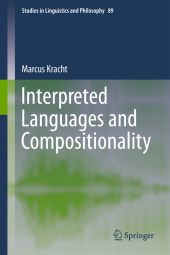 Neuerscheinungen 2013Stand: 2020-01-07 |
Schnellsuche
ISBN/Stichwort/Autor
|
Herderstraße 10
10625 Berlin
Tel.: 030 315 714 16
Fax 030 315 714 14
info@buchspektrum.de |

Marcus Kracht
Interpreted Languages and Compositionality
2011. 2013. x, 214 S. X, 214 p. 235 mm
Verlag/Jahr: SPRINGER NETHERLANDS; SPRINGER, BERLIN 2013
ISBN: 9400737564 (9400737564)
Neue ISBN: 978-9400737563 (9789400737563)
Preis und Lieferzeit: Bitte klicken
Since the rise of formal semantics in the 1970s, the issue of ´compositionality´ has gained traction in linguistics. This book argues that there exist non-compositional languages. Moreover, syntactic structure can be motivated from the requirement of providing a compositional grammar.
This book argues that languages are composed of sets of ´signs´, rather than ´strings´. This notion, first posited by de Saussure in the early 20 th century, has for decades been neglected by linguists, particularly following Chomsky´s heavy critiques of the 1950s. Yet since the emergence of formal semantics in the 1970s, the issue of compositionality has gained traction in the theoretical debate, becoming a selling point for linguistic theories.
Yet the concept of ´compositionality´ itself remains ill-defined, an issue this book addresses. Positioning compositionality as a cornerstone in linguistic theory, it argues that, contrary to widely held beliefs, there exist non-compositional languages, which shows that the concept of compositionality has empirical content. The author asserts that the existence of syntactic structure can flow from the fact that a compositional grammar cannot be delivered without prior agreement on the syntactic structure of the constituents.
1. Synopsis .- 2. String Languages . 2.1 Languages and Grammars . 2.2 Parts and Substitution . 2.3 Grammars and String Categories . 2.4 Indeterminacy and Adjunction . 2.5. Syntactic Structure . 2.6 The Principle of Preservation .- 3. Compositionality . 3.1 Compositionality . 3.2 Interpreted Languages and Grammars . 3.3 Compositionality and Independence . 3.4 Categories . 3.5 Weak and Strong Generative Capacity . 3.6 Indeterminacy in Interpreted Grammars . 3.7 Abstraction .- 4. Meanings . 4.1 ´Desyntactified´ Meanings . 4.2 Predicate Logic . 4.3 Concepts . 4.4 Linking Aspects and Constructional Meanings . 4.5 Concepts and Pictures . 4.6 Ambiguity and Identity . 4.7 Profiling .- 5. Examples . 5.1 Predicate . 5.2 Concept Based Predicate Logic . 5.3 A Fragment of English . 5.4 Concepts and LF 5.5 The Structure of Dutch . 5.6 Arguing for Syntactic Structure .- 6. Conclusion .- A. Useful Mathematical Concepts and Notation .- B. Symbols .- C. Index .- Bibliography


